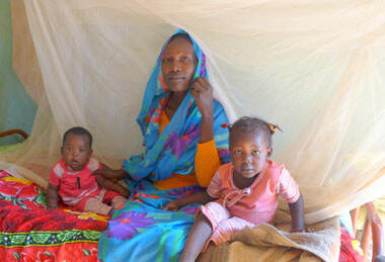Sudan steps up malaria campaign ahead of rainy season
July 25, 2014 (KHARTOUM) – Sudan is stepping up measures to combat the spread of malaria ahead of the upcoming rainy season.

The measures are expected to protect an estimated 2.25 and 3.6 million people.
The insecticide, which lasts between three and eight months, is sprayed over stagnant water and used for indoor residual spraying to prevent the spread of malaria and dengue.
Malaria is a major cause of death in Sudan, particularly among young children and pregnant women.
There are an estimated 5.5 million cases of malaria per year in Sudan, with nearly 75 per cent of the total population at risk. In the north of the country, 16 per cent of hospital deaths are attributed to the disease.
The rainy season in Sudan usually begins in July and runs through October.
The International Organization for Migration (IOM), with funding from the UN Common Humanitarian Fund, will provide six tonnes of permethrin EC 25%, which will be used to cover 30 per cent of needs countrywide during the rainy season.
Pesticide spraying will primarily target internally displaced, returnee and host communities in malaria-affected areas.
According to IOM, increased rainfall, the spread of irrigation within city limits and construction of new urban colonies without proper drainage facilities, as well as the influx of refugees and internally displaced persons have all contributed to the spread of malaria in the region.
The government’s prevention programme will involve the participation of Sudan’s National Flood Taskforce, which coordinates emergency response operations throughout the country.
The taskforce is a government-led body established in August 2013, comprising of government institutions and humanitarian actors, including IOM, UN agencies and NGOs.
Malaria is transmitted via the bites of infected mosquitoes and symptoms include fever and flu-like illness, including shaking chills, headache, muscle aches, and tiredness.
According to the World Health Organisation (WHO), 5 to 12 per cent of malaria-infected people die from the disease, with children under three years of age four times more likely to die than others.
(ST)
